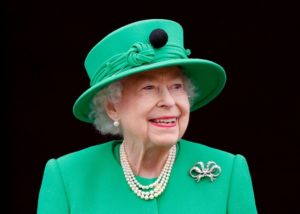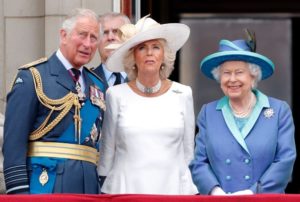Editor’s Note: From the Back Forty is Liberty Nation’s longest-running and most popular weekly column. Capturing the truth each week from heartlanders in flyover states, LN gives voice to the hard-working Americans otherwise ignored by the coastal elites.
 News of Queen Elizabeth II’s passing sparked widely different perspectives and levels of interest in Flyover states. She took the throne in 1952 and ruled for 70 years; after such a long reign, there was a lot of unpacking – mostly on social media. From downright callous expressions to an outpouring of condolences to the British people, and an unlikely group of dedicated horse lovers, the queen did not pass without leaving behind a strong impression – good or bad.
News of Queen Elizabeth II’s passing sparked widely different perspectives and levels of interest in Flyover states. She took the throne in 1952 and ruled for 70 years; after such a long reign, there was a lot of unpacking – mostly on social media. From downright callous expressions to an outpouring of condolences to the British people, and an unlikely group of dedicated horse lovers, the queen did not pass without leaving behind a strong impression – good or bad.
Stoicism and Courage Earned Respect
Elizabeth took the reins of the kingdom at age 25 upon the death of her father, King George VI, and waded into the aftermath of WWII and encroaching technology: namely, television. The first-ever televised Christmas message was delivered in 1957 – prior to that it had always been a radio address. It appears she was rattled by the ability of the new device to invade one’s living room, but it served her well. In that first TV address, she warned:
“It’s not the new inventions which are the difficulty. The trouble is caused by unthinking people who carelessly throw away ageless ideals as if they were old and outworn machinery. They would have religion thrown aside, morality in personal and public life made meaningless, honesty counted as foolishness and self-interest set up in place of self-restraint.”
The decades-old message resonated with folks across the US, especially in Middle America. Clark Hanson, in Watertown, SD, spoke up: “Far ahead of her time, she lived a life of grace, dignity, loyalty to her people, and example. The queen’s detractors on this thread are the unthinking people she is speaking about.”

Queen Elizabeth II (Photo by Max Mumby/Indigo/Getty Images)
Elizabeth met 13 of the 14 most recent US presidents, starting with Harry Truman and concluding with Joe Biden. Heartlanders wondered how the current president managed to outlive the 96-year-old, or as Randy Schultheiss in Minneapolis asked, “Is Joe Biden immortal?” Her only presidential miss was Lyndon Johnson, whom she never met face-to-face.
In a demonstration to Britain’s greatest ally, the queen broke with tradition and ordered “The Star-Spangled Banner” played in front of Buckingham Palace in the aftermath of the Sept. 11 terrorist attacks. “Yep, the gal had grit,” offered Larry Preston in Utah.
And Melody McCrary in Phenix City, AL, offered her condolences: “She did not have to be ‘in your face,’ vulgar, rough, and rude to be heard. She was dignified, confident, and committed to her values. She was a woman who took her responsibilities seriously and never wavered from her route. Will there ever be another? I doubt it!”
And that morphed into the subject of Elizabeth II’s successor.
The New King and His Consort
There were few and very far between words of praise from the US for the new king and his consort. And most were unfortunately reminded of the death of Princess Diana in 1997. After the very public and sad divorce of the royal couple, Charles was relatively quick to press Camilla Parker Bowles into service as his partner. Some folks still have a raw feeling over the whole sordid affair and offered to share. Karla Phinney in South Carolina spoke out: “Hard to forget what he did to Diana.” And in Batavia, IL, Karen Mahler Mulvaney did not hold her contempt well: “The side chick won.”
Coverage of Camilla in the UK seems to reveal she has largely rehabilitated her image throughout Great Britain, but she still has work to do in the US.

Charles, Camilla, and Queen Elizabeth II (Photo by Max Mumby/Indigo/Getty Images)
Media Not So Polite
Harvard professor Maya Jasanoff contributed to the fray of unsolicited opinion through the elitist media by penning an op-ed in The New York Times. In part, Jasanoff observed of the queen’s reign, “She has been a fixture of stability, and her death in already turbulent times will send ripples of sadness around the world. But we should not romanticize her era.” You could not stand to be polite, Maya? She continued that Elizabeth II’s image principally helped to “obscure a bloody history of decolonization.”
Maya isn’t the only one, though: Richard Stengel, a former State Department official, appeared on MSNBC with Nicolle Wallace and pontificated – yes, out loud – about white privilege. “I’m going to be the skunk at the garden party; I think there is a weakness in the American character that still yearns for that era of hereditary privilege,” he declared.
In Ohio, Timothy Humpert opined, “Wow. These people have issues.” Jim Inderdahl, in Tilleda, WI, took offense at some of the comments and reminded folks of their manners: “Decent people would offer condolences, if you didn’t like the person so much, the least you could do is to just not say anything, the person you think makes you feel bad is gone, the only comments should be condolences, liberal, conservative, communist, decent people do not attack people when they pass.” And Maureen Brown Thomas also pointed out the impeccable manners of the queen: “Our leaders here in the US have a lot to learn. For starters, I can’t imagine her referring to her fellow citizens as ‘Deplorables’ or ‘Johnsonies.’”
Horse People Knew the Queen’s Value
A little-known part of the queen’s life was her dedication to saving certain horse breeds. Cleveland Bays were used as coach horses and then war horses – used to pull artillery – and became something of an iconic breed. As their popularity dwindled, by the 1960s, there were only four stallions in Great Britain. Queen Elizabeth stepped in and saved the breed. Horse lovers worldwide, and, of course, in the US, celebrated her dedication. As Debbie Durbin in Blue Mound, IL, stated, “She loved her horses and dogs.” And really, sometimes that might be enough of a sendoff.

